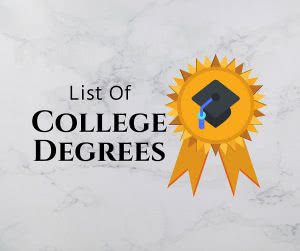 Have you ever wondered just how many different degrees are offered to you through colleges and universities? It’s important to learn about what’s available, because some jobs demand 2 year degrees while others ask for Doctorates. Here’s a breakdown and list of college degrees, both undergraduate and graduate.
Have you ever wondered just how many different degrees are offered to you through colleges and universities? It’s important to learn about what’s available, because some jobs demand 2 year degrees while others ask for Doctorates. Here’s a breakdown and list of college degrees, both undergraduate and graduate.
List of College Degrees
-
Undergraduate
-
Associate’s degree
-
Bachelor’s degree
-
-
Graduate
-
Master’s degree
-
Doctoral degree
-
Professional degree
-
Associate’s Degree
The degree that requires the shortest time investment that you can get from college is called an Associate’s Degree. It takes an average of two years to earn this one, but it can also be applied towards your Bachelor’s degree efforts if you decide to continue your education after graduation. This is the type of degree that most community colleges and vocational schools offer.
Variations of Associate’s Degrees:
- (AA) Associate of Arts
- (AS) Associate of Science
- (AAS) Associate of Applied Science

Bachelor’s Degree
The second undergraduate degree is called a Bachelor’s. It typically takes four years to earn a Bachelor’s, but many students graduate in five or six years. The requirements for this degree also depend on your area of study and the school you attend. This is the most common type of degree, and is required for many jobs and careers post graduation.
Variations of Bachelor’s Degrees:
- (BA) Bachelor of Arts
- (BS) Bachelor of Science
- (BFA) Bachelor of Fine Arts
Master’s Degree
The first graduate level on a list of college degrees is a Master’s. There are two different types of these: academic and professional. If you earn an academic Master’s degree, you’re most likely continuing to get your Doctoral degree. For professional, you probably are earning this degree to advance your career. Many, but not all, four year colleges offer Master’s. They take one to two years to earn.
Variations of Master’s Degrees:
- (MA) Master of Arts
- (MS) Master of Science
- (MBA) Master of Business Administration
Doctorate Degrees
Doctorate degrees require extensive research and teaching. They’re the last degree most professions can earn and they can take between 5 to 7 years to complete. Not all subjects are offered in doctorate degrees and they tend to fall under very narrow focuses for study. Extremely advanced, they are most well known for their part in health professions. Additionally, depending on the program, doctorate degrees can get very specific. We’ll list some of the more common ones below.
Variations of Doctoral Degrees
- (PhD) Doctor of Philosophy
- (DBA) Doctor of Business Administration
- (DA) Doctor of Arts
Professional Degrees
These are very similar to Doctoral degrees, but slightly different. They can be pursued if you’re planning to work in law or medicine. For example, a law or medical degree is a Professional degree. However, these types are only offered at law or medical schools. Also like Doctoral degrees, the degree type/name can be very specific to your field. We’ll list some of the more common ones below:
Variations of Professional Degrees:
- (JD) Juris Doctorate
- (MD) Medical Doctor
- (DDS) Doctor of Dental Surgery
As you can see, there are quite a few degree options you have when it comes to college. Some careers only require an Associate’s degree, while others may demand a Doctorate. A Doctorate degree can also demand quite a lot of time when it comes to education if that is your end goal. When researching careers and potential majors, it’s also important to research just how much education and what degree you’ll need to work towards your dream job.
Want to know what type of degree your dream job requires? Visit College Raptor’s Career Center! Simply search for the career and scroll down to the Education Level section! You can also learn a ton of other useful information while you’re there—like average wages and the best colleges for that career!





